Pregnant Woman Wants Dogs To Sleep In The Living Room To Prepare For Baby's Arrival, But Husband Strongly Disagrees
There are many theories on the internet regarding dogs and newborns, but in the end, if you have a strong feeling, you should consider it. LittleWitchyMama, a Reddit user who is pregnant and due soon, recently shared a post on the "AITA" subreddit expressing her worries about having her two dogs in the same room as her newborn baby.
In the post, she explains that although the dogs are not aggressive, one of them, an American Bulldog, gets excited easily, which makes her concerned about any potential dangers that could arise if the dogs are not supervised when the baby arrives.
LittleWitchyMama wants to keep the dogs in the living room while they sleep, but her husband wants to keep them in the same room and see how it goes. This has led to arguments between them, but LittleWitchyMama is adamant about ensuring the safety of their baby and doesn't want to take any risks.
The fact that she has woken up twice to find her other dog lying in the bassinet where the baby will be sleeping raises her concerns further. LittleWitchyMama is seeking advice on what to do in this situation, as she wants to make sure her baby is safe.
Here's how the AITA community responded to her post.
Here's OP's post

1. Getting ahead of the situation is a good idea.
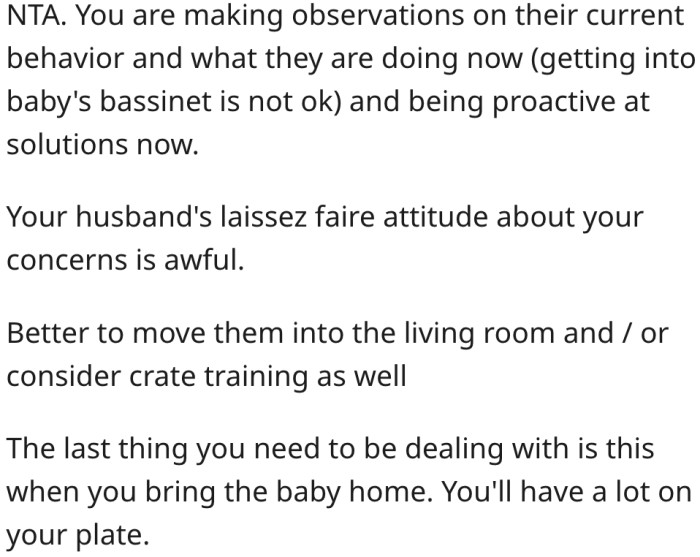
2. There is a possibility that dogs can suffocate babies.

Understanding Pet Ownership in Family Dynamics
Dr. Rebecca Foster, a family therapist, notes that introducing a pet into a family can create both excitement and tension.
Her research emphasizes that differing opinions on pet care can lead to conflicts, particularly between partners.
This dynamic requires open communication to navigate effectively.
The Dynamics of Preparing for a New Baby
Preparing for a new baby often brings about complex emotions and concerns, particularly when existing pets are involved. Research in developmental psychology indicates that transitions in family dynamics can lead to increased anxiety and stress, especially for expectant parents.
Dr. David C. Schwebel's studies on family transitions emphasize that clear communication and planning can help alleviate some of these anxieties, allowing families to navigate changes more smoothly.
3. It's best to be cautious.

4. Dogs can be unpredictable.

5. Her husband's decision could lead to a tragic outcome.

Interestingly, disagreements over pets often reflect deeper relational issues. According to Dr. Esther Perel, a renowned couples therapist, "Conflicts about pets can reveal underlying tensions in a relationship, as they often symbolize deeper emotional needs." This insight emphasizes the importance of addressing these underlying issues to foster healthier conversations. As Dr. Michele Weiner-Davis, a marriage therapist, notes, "It's crucial to communicate openly about our feelings and needs, especially when it comes to family dynamics." Understanding these perspectives can lead to more constructive discussions.
Moreover, the decision to adjust pet living arrangements can reflect broader concerns about safety and comfort. According to research from the Journal of Pediatrics, families often grapple with balancing the needs of their pets with those of a newborn, leading to heightened stress levels.
This underscores the importance of creating a safe environment for both pets and children, ensuring that everyone feels secure during this transition.
6. It's best to move the dog before the baby arrives.

7. Her husband can sleep outside with the dogs if he does not want them to feel lonely.

8. Her husband needs to read about the potential dangers.

The Role of Compromise in Family Decisions
Compromise plays a crucial role in maintaining harmony in family decisions, particularly regarding pet ownership.
Research indicates that families who practice compromise tend to experience lower levels of conflict and greater satisfaction.
Developing negotiation skills can help families find common ground and foster cooperation.
Understanding the Role of Pets in Family Dynamics
Pets often serve as integral members of the family, contributing to emotional well-being and companionship. Research indicates that the introduction of a new family member can disrupt established routines, leading to feelings of anxiety for both pets and parents.
Dr. John Archer's work on animal behavior suggests that pets may experience jealousy or displacement during significant family changes, which can impact their behavior and the overall family dynamic.
9. The dogs can stay in the living room until the baby is older.
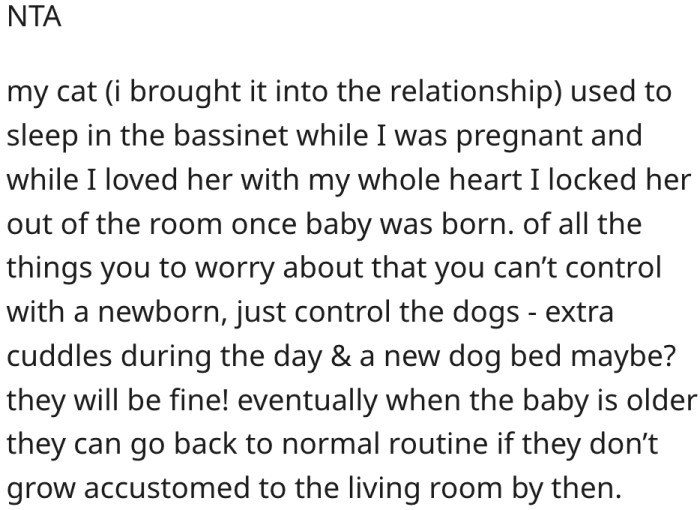
10. Her husband may change his mind when he bonds with the baby.

11. The dogs should already be sleeping in the living room.

To promote compromise, families can engage in discussions that prioritize each member's needs and concerns.
Implementing structured family meetings can create a safe space for open dialogue and collaboration.
This approach encourages active participation and ensures everyone’s voice is heard.
However, it’s crucial to approach these adjustments with compassion and understanding. Research in family therapy highlights the importance of empathy in navigating transitions, ensuring that all family members, including pets, feel valued and included during the change.
Dr. Virginia Satir’s therapeutic techniques emphasize the significance of nurturing relationships during difficult times, promoting harmonious family dynamics.
12. They may go to jail if the dogs harm the baby.
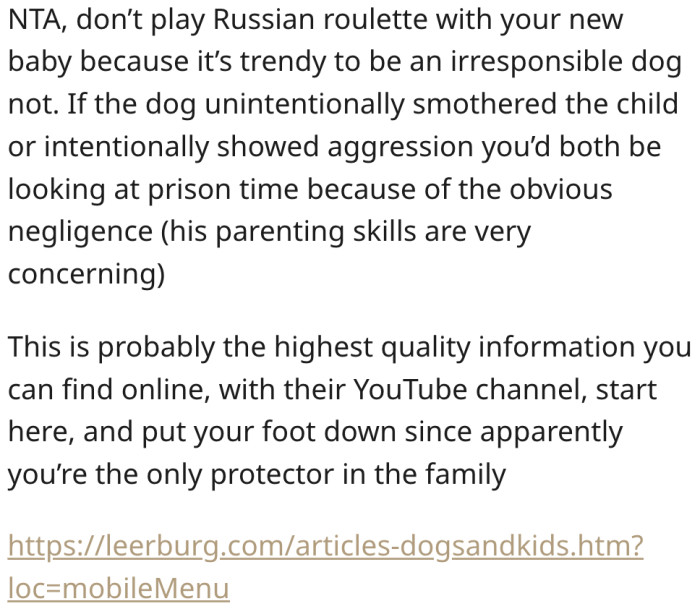
13. Her husband's attitude is cause for concern.

14. If they don't start now, the dogs will associate the change with the baby's arrival.

The Importance of Emotional Support for Families
Emotional support is vital in navigating changes within family dynamics, especially when introducing new pets.
Research shows that strong emotional bonds can enhance family resilience and cohesion.
Encouraging empathy and understanding during transitions can help families adjust more smoothly.
Practical Strategies for Integrating Pets and Newborns
To successfully integrate pets into a household with a newborn, families can implement gradual introductions and structured routines. Research suggests that slowly acclimating pets to the presence of a new baby can mitigate anxiety and promote positive interactions.
Dr. Sophia Yin, a veterinarian and animal behaviorist, recommends using positive reinforcement techniques to help pets associate the new baby with positive experiences, fostering calmness and acceptance.
15. Nothing is stopping the dogs from accidentally hurting the baby.

16. She should start training the dogs not to get excited when she is carrying something.
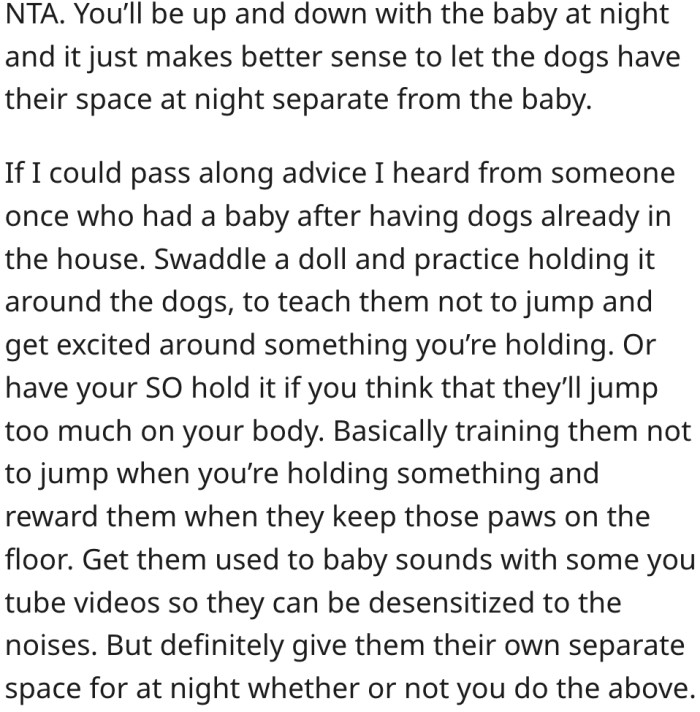
17. It seems like she has not properly prepared her home to welcome a baby.
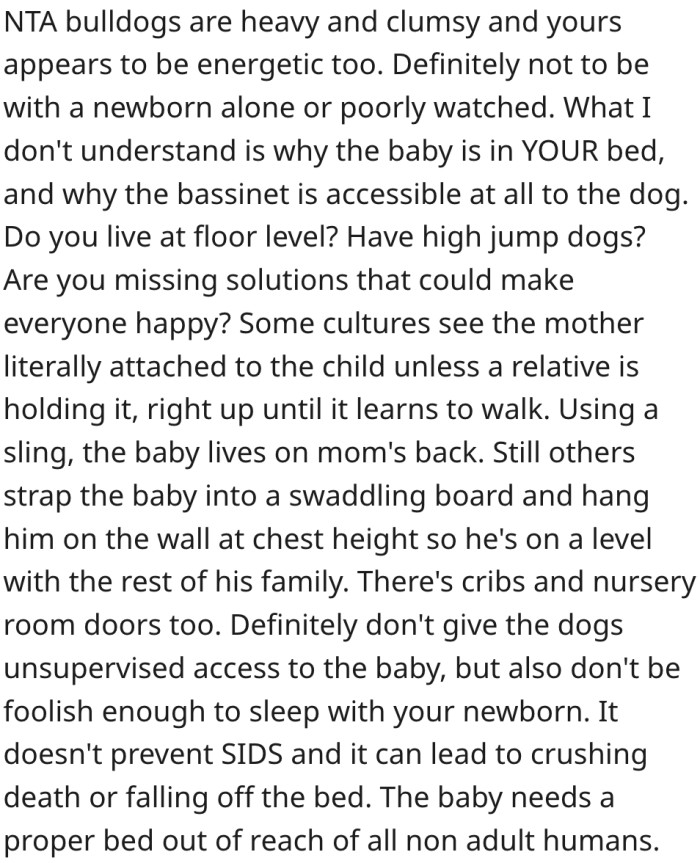
To foster emotional support, families can engage in shared activities that strengthen their connections.
Participating in group pet care tasks or outings can enhance teamwork and promote a sense of belonging.
These shared experiences can create lasting family memories and strengthen bonds.
Additionally, creating designated spaces for both pets and the newborn can enhance feelings of security. Research indicates that having separate, safe areas for pets and children can reduce stress and promote a sense of predictability in the home environment.
Dr. Stephen P. Hinshaw notes that establishing routines can lead to improved emotional regulation for everyone involved, contributing to a more harmonious household.
18. Pets can develop bad behaviors around new babies.

19. Different things could go wrong with the dogs in the room.
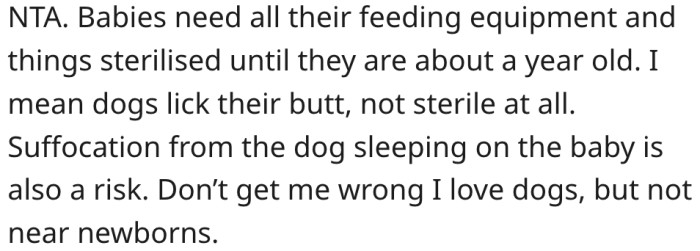
20. Her hormones may be causing her irrational worries.

Building Responsibility Through Pet Care
Involving children in pet care can promote responsibility and empathy, essential skills for their development.
Research indicates that children who engage in pet care show improved social skills and self-esteem.
This involvement fosters a sense of agency and connection to the family.
The Importance of Communication in Family Transitions
Open communication is vital when preparing for a new baby, especially in discussions about pet care and living arrangements. Research in family dynamics underscores that clear conversations can prevent misunderstandings and foster a supportive environment.
Dr. John Gottman's research on communication patterns highlights that discussing expectations and concerns openly can enhance relationship satisfaction and cohesion during significant life changes.
What do you think?
Having dogs in the same room as a newborn baby can be potentially dangerous, as dogs can be unpredictable and may accidentally harm the baby. Dogs are often curious and may be excited by the new addition to the family, causing them to jump or paw at the baby.
Dogs may also mistake a baby’s movements as play and can potentially bite or scratch the baby. Even if a dog has been well-trained and obedient in the past, their behavior may change around a new baby.
It is best to err on the side of caution by taking precautions to keep the dog away from the baby’s crib or bassinet. What do you think?
Ultimately, preparing for a new baby while considering the well-being of pets requires thoughtful planning and empathy. By fostering an environment of open communication and structured routines, families can navigate this transition more effectively, ensuring that all members feel valued and secure.
Engaging pets in the preparation process can also provide valuable lessons in empathy and responsibility for older children, enriching family dynamics.
Psychological Analysis
This situation illustrates the delicate balance of integrating a new family member while considering the needs of existing pets. It’s essential to approach this transition with empathy, ensuring that all family members feel included and secure. Engaging in open communication can promote harmony and strengthen family bonds during this significant change.
Analysis generated by AI
Analysis & Alternative Approaches
Research supports that preparing for a new baby involves navigating complex family dynamics, particularly when pets are involved. Thoughtful planning and open communication can enhance feelings of security and belonging for all family members.
By fostering empathy and understanding, families can create a harmonious environment that supports positive growth during this transitional period.
Encouraging children to participate in age-appropriate pet care activities can enhance their emotional development.
Practices such as feeding, walking, and grooming can create opportunities for bonding and skill-building.
These activities also reinforce family values and teamwork.
Analysis & Alternative Approaches
In summary, navigating pet ownership within family dynamics requires communication, compromise, and emotional support.
By fostering shared responsibilities and encouraging open dialogue, families can enhance their connections and successfully integrate pets into their lives.
Ultimately, these strategies can lead to stronger family bonds and a nurturing environment for all members.



